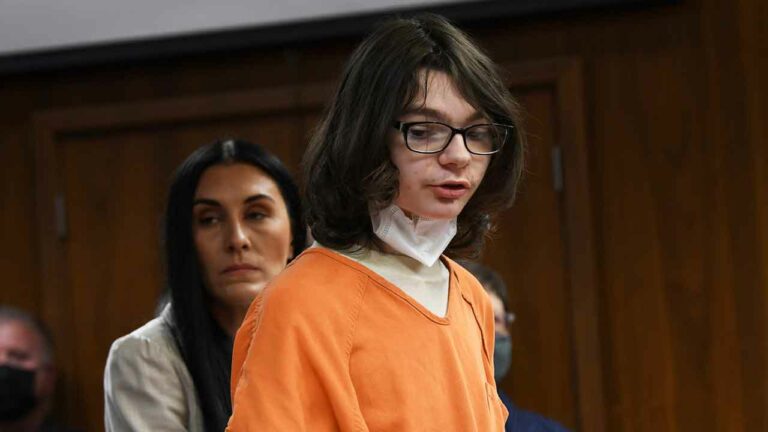Michigan Teen Faces Life Without Parole for School Shooting
Warning: Graphic Content
Ethan Crumbley, the Michigan teenager responsible for a deadly high school shooting in 2021, has been ruled to face a potential life sentence without parole by Judge Kwame Rowe. This tragic incident left four students dead and seven others injured.
Crumbley, aged 15 at the time, entered Oxford High School on the morning of November 30, 2021. He initially attended classes, met with a school counselor alongside his parents, and then returned to class. However, the day took a horrifying turn when he retrieved a firearm from his backpack and proceeded to take the lives of 16-year-old Tate Myre, 16-year-old Justin Shilling, 14-year-old Hana St. Juliana, and 17-year-old Madisyn Baldwin.
In October 2022, Crumbley pled guilty to 24 counts, including four counts of first-degree murder. The ongoing proceedings revolve around whether this now 17-year-old will receive a life sentence without parole, a penalty typically reserved for adult offenders.
Oakland County prosecutor Karen McDonald stressed the gravity of such sentences for juvenile offenders, stating that they should be rare and employed judiciously.
A sentencing hearing for Crumbley is scheduled for December 8.
McDonald commended the teachers and students who testified, expressing hope that the outcome will bring some comfort to the victims, their families, and the Oxford community.
Notably, this case marks the first instance where a defendant has been charged with terrorism as a result of a mass shooting, which carries a possible sentence of life without parole.
During Miller hearings, courts consider juvenile brain development. Adolescents, due to their still-developing brains, may not fully grasp the consequences of their actions. However, prosecutors argued that Crumbley’s actions deviated from typical adolescent behavior, citing extensive planning, firearm research, and practice.
Crumbley’s defense attorney contended that the teenager displayed signs of severe mental illness before the shooting and that his parents and school officials failed to provide assistance. They also emphasized the potential for rehabilitation.
McDonald’s opening statements revealed video footage of Crumbley’s point-blank shootings in the school hallways. Crumbley’s expressed desire to be “famous” and the absence of suicidal intentions further deepened the grim narrative.
Crumbley’s notes indicated disturbing intentions and thoughts, including a wish to hear children’s screams as he shot them. His parents, James and Jennifer Crumbley, are also facing involuntary manslaughter charges for purchasing a firearm for their son.
The prosecutor clarified that the parents’ charges stem from gross negligence, specifically the acquisition of a firearm, inadequate security measures, and inaction upon seeing concerning drawings on the day of the shooting.
Ethan Crumbley’s notes suggested his expectation of a life sentence and disturbing thoughts. In one entry, he lamented spending his life in prison, and in another, he expressed an unsettling desire for his first victim.
The prosecution revealed that school officials had met with Crumbley and his parents to discuss his violent drawings shortly before the shooting. Despite these concerns, the suspect convinced them that the drawings were related to a video game.
Crumbley’s defense asserted that the teenager is not beyond rehabilitation and change as he matures into adulthood. The hearing concluded with testimony from psychologist Colin King, who cited manic depression and psychosis in Crumbley’s evaluation, describing him as a “feral child” who was abandoned at a critical stage of his life. King argued that rehabilitation remains a possibility for Crumbley.

